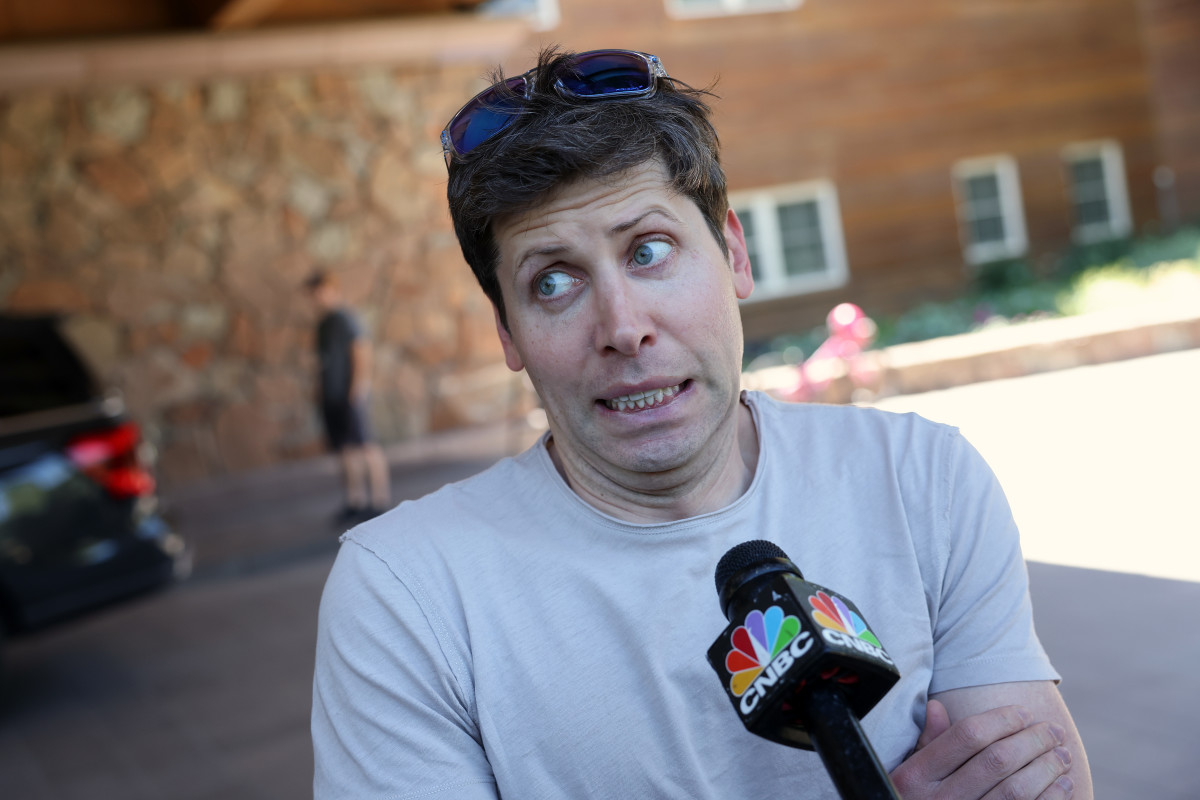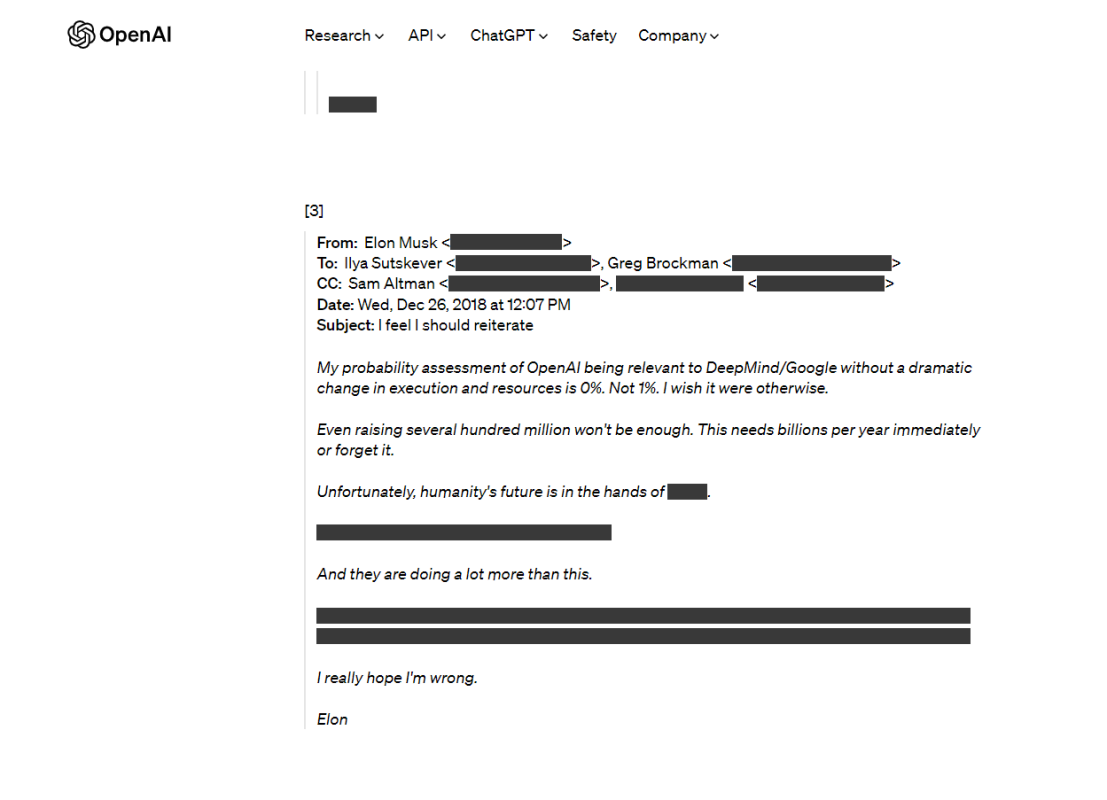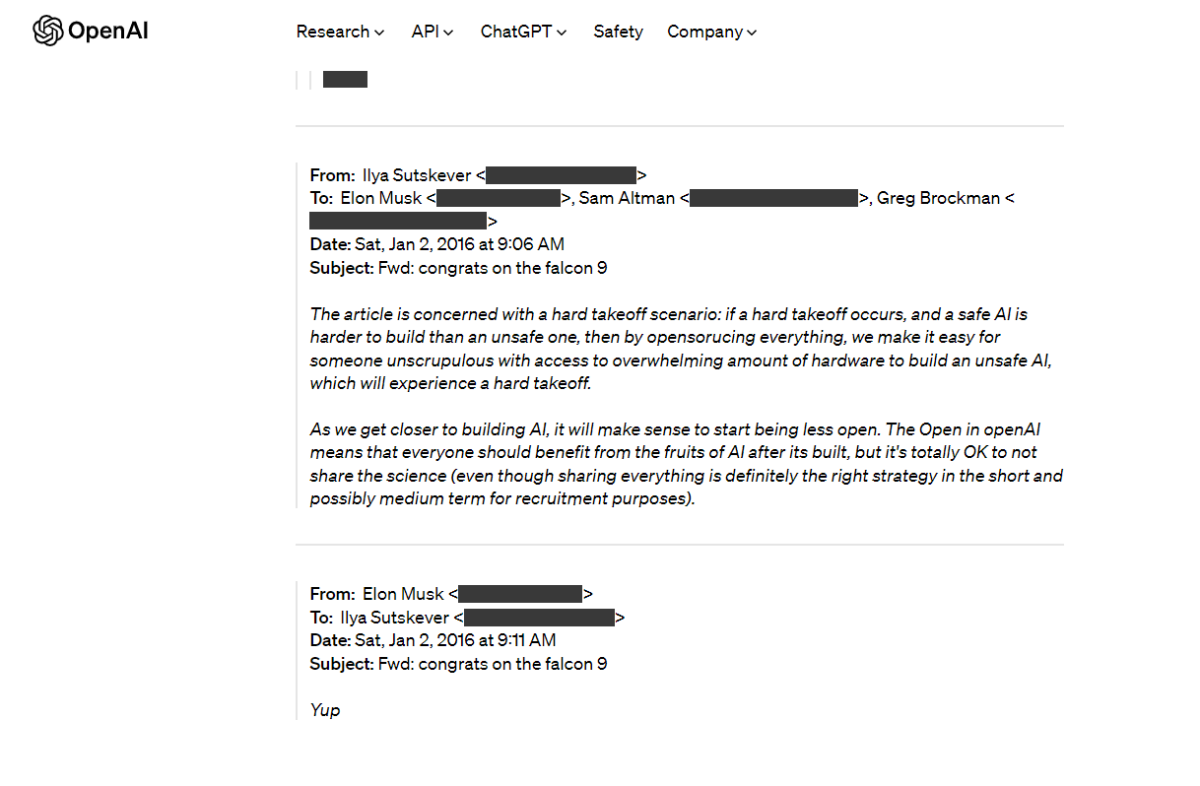
ChatGPT-maker OpenAI is moving to dismiss all the claims brought against it in the lawsuit filed last week by Elon Musk, in which Musk argued that OpenAI has strayed far from its original nonprofit charter.
In a blog post published late Tuesday, OpenAI published a string of emails from 2015 in which Musk himself points out the enormous price tag necessary to make artificial intelligence technology work.
After donating $45 million, Musk told OpenAI that the company needs to start with a $1 billion funding commitment, according to the post; with a total of only $90 million raised, Musk offered to "cover whatever anyone else doesn't provide" to reach that number.
Related: Gary Marcus says Elon Musk 'has a point' with latest lawsuit against Sam Altman, OpenAI
"As we discussed a for-profit structure in order to further the mission, Elon wanted us to merge with Tesla (TSLA) or he wanted full control," OpenAI said. "Elon left OpenAI, saying there needed to be a relevant competitor to Google/DeepMind and that he was going to do it himself."
The company claimed that both the board and Musk decided in 2017 that the nonprofit research lab needed a for-profit entity to fund its efforts. Musk, according to the post, initially wanted "majority equity, initial board control and to be CEO. In the middle of these discussions, he withheld funding."
After that attempt failed, Musk suggested OpenAI merge with Tesla "as its cash cow," saying that such a move was the only way that the company could hope to "hold a candle to Google."
Musk told the company in an email dated 2018 that "even raising several hundred million won't be enough. This needs billions per year immediately or forget it."

OpenAI
And to refute Musk's claim that OpenAI is, despite its original charter, neither open nor transparent, the company shared an email dated Jan. 2, 2016, in which Ilya Sutskever — one of OpenAI's cofounders — said that the closer the company gets to building AI, "it makes sense to start being less open."
"The Open in OpenAI means that everyone should benefit from the fruits of AI after it's built, but it's totally OK to not share the science (even though sharing everything is definitely the right strategy in the short and possibly medium term for recruitment purposes)," Sutskever said.
Musk agreed with the note, saying in response: "Yup."
Tesla did not immediately respond to a request for comment, although Musk did reply to a user post on X about the content of the emails OpenAI shared.
lol
— Elon Musk (@elonmusk) March 6, 2024
Related: Tesla Chief Musk is pleased with the result of OpenAI’s 'Game of Thrones'

OpenAI
"OpenAI’s reply to Elon Musk may turn out to be one of the biggest own-goals of all time, because ... it inadvertently revealed that they have been lying from the jump." - AI researcher and cognitive scientist Gary Marcus
In a blog post that was published just a few weeks before Sutskever's email, OpenAI seems to have publicly taken a markedly different stance, saying: "As a non-profit, our aim is to build value for everyone rather than shareholders. Researchers will be strongly encouraged to publish their work, whether as papers, blog posts, or code, and our patents (if any) will be shared with the world. We’ll freely collaborate with others across many institutions and expect to work with companies to research and deploy new technologies."
In its response to Musk, the company goes on to argue that OpenAI is making its technology broadly usable "in ways that empower people and improve their daily lives."
It makes no mention of the risks its tools pose, or the harms they have already caused, from copyright infringement to environmental impacts to massively scaled-up fraud, scam and phishing efforts that can impact elections as much as they can enhance bullying and harassment.
If you have a certain combination of naïveté and self-delusion, you might think that superhuman AI is just around the corner.
— Yann LeCun (@ylecun) March 6, 2024
It wasn't true in 2016.
And it's still not true today.
If you have a bit of a superiority complex, you might think that you will be the one producing… https://t.co/ImOjZb2f2e
"We can’t let lawsuits ... distract from the fact that these models are built on creators’ work without permission, and will inevitably replace a significant proportion of the demand for that work," Ed Newton-Rex, the CEO of the non-profit Fairly Trained, said. "You can’t say you will 'empower every individual' when you’re doing the precise opposite — exploiting individuals’ work — to get there."
OpenAI did not immediately respond to a request for comment regarding these points.
"What a mendacious company to the very core," AI researcher and cognitive scientist Gary Marcus said. "OpenAI’s reply to Elon Musk may turn out to be one of the biggest own-goals of all time, because ... it inadvertently revealed that they have been lying from the jump."
Related: AI tax fraud: Why it's so dangerous and how to protect yourself from it
Legal expert: Musk's case isn't a slam dunk
Through his lawsuit, Musk is seeking a legal requirement forcing OpenAI to return to its original charter. He is also seeking damages and the restitution of the money he donated to OpenAI while it was engaged in the "unfair" practices laid out in the lawsuit.
"OpenAI has been transformed into a closed-source de facto subsidiary of the largest technology company in the world: Microsoft," the suit claims. "Under its new Board, it is not just developing but is actually refining an AGI to maximize profits for Microsoft, rather than for the benefit of humanity."
The complaint alleges breach of contract, breach of fiduciary duty and unfair business practices, among other things.
Ira Steinberg, a partner in Greenberg Glusker’s Litigation Group, told TheStreet that while Musk's complaint is well-written, he thinks it unlikely that Musk will be able to achieve his "real goal, which is to change how OpenAI is operating and enforce his views of how AI research should progress."
"The claims appear to be Musk attempting to vindicate a philosophical interest in how AI research should proceed and how OpenAI should operate. Those kinds of claims are inherently difficult for an individual to bring," Steinberg said, adding that legally, the case will turn on the "extent to which OpenAI has a duty to Musk personally to abide by the spirit of its founding."
More deep dives on AI:
- ChatGPT maker says 'it would be impossible' to train models without violating copyright
- Copyright expert predicts result of NY Times lawsuit against Microsoft, OpenAI
- Meta and IBM team up against dominant Big Tech players
Steinberg said that Musk's arguments both of breach of contract and promissory estoppel — a quasi-contract where someone relies on an oral promise to their detriment — are weak to the goal of the case. Even if Musk can prove these claims, the legal remedy would involve the return of his donation.
The problem with Musk's argument of breach of fiduciary duty, according to Steinberg, is that the statute "states that duties arise from the creation of a 'charitable trust.'" He said that "very few people have the power to sue for a breach of the duties owed in a charitable trust," adding that normally, it is the Attorney General" who would bring such a suit.
Steinberg said that the legal theory throughout Musk's suit is "probably not" strong enough to accomplish his goal of re-steering OpenAI's governance. Musk's strongest claims, he said, are for the return of his donations.
Steinberg expects OpenAI to knock out some of the claims in a motion to dismiss, "but would not be surprised to see other claims survive, in particular the promissory estoppel and unfair business practices claims."
He thinks it is realistically possible that the case goes to discovery, though he is skeptical it will make it to a trial.
Contact Ian with tips and AI stories via email, ian.krietzberg@thearenagroup.net, or Signal 732-804-1223.
Related: Meet Sam Altman, the man behind OpenAI's revolutionary ChatGPT







